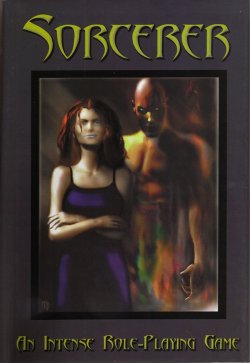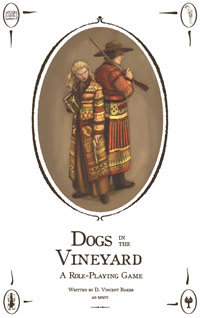
GNS theory is an informal field of study developed by Ron Edwards which attempts to create a unified theory of how role-playing games work. Focused on player behavior, in GNS theory participants in role-playing games organize their interactions around three categories of engagement: Gamism, Narrativism and Simulation.

Sorcerer is an occult-themed indie role-playing game written by Ron Edwards and published through Adept Press. The game focuses on sorcerers who summon, bind, and interact with demons, powerful non-human entities who work with and against the sorcerer.

John Wick is an American role-playing game designer best known for his creative contributions to the tabletop role playing games Legend of the Five Rings and 7th Sea. He self-published Orkworld under the Wicked Press banner, and later co-founded the Wicked Dead Brewing Company with Jared Sorensen. His games under that company include Cat, Schauermärchen, Enemy Gods, and Thirty. He has won the Origins Award for Best Role-Playing Game and Best Collectible Card Game twice.

The Diana Jones Award is an annual award for "excellence in gaming". The original award was made from a burned book encased in lucite. The award is unusual in two ways: first, it is not an award for a specific class of thing, but can be awarded to a person, product, publication, company, organization, event or trend – anything related to gaming; second, it does not count popularity or commercial success as a sign of "excellence". The award was first presented in 2001.

My Life with Master is an independently published role-playing game written by Paul Czege and published by Half Meme Press . My Life with Master is a game about role-playing the servants or minions of an evil Master or Mistress. The game won several awards, and reviewers recognized it as well-written.

The threefold model or GDS theory of roleplaying games is an attempt to distinguish three different goals in roleplaying. In its original formation, these are: Drama, simulation, and game. It was the inspiration for subsequent theories, such as the GNS theory, which retained a three-way division but altered other aspects of the model.

Dogs in the Vineyard is an independently published role-playing game published by Lumpley Games in 2004 that is loosely based on the history of the Mormons.

An indie role-playing game is a role-playing game published by individuals or small press publishers, in contrast to games published by large corporations. Indie tabletop role-playing game designers participate in various game distribution networks, development communities, and gaming conventions, both in person and online. Indie game designer committees grant annual awards for excellence.
Clinton R. Nixon is a designer and publisher of indie role-playing games.

Role-playing game theory is the study of role-playing games (RPGs) as a social or artistic phenomenon, also known as ludology. RPG theories seek to understand what role-playing games are, how they function, and how the gaming process can be refined in order to improve the play experience and produce better game products.
The Indie RPG Awards were annual, creator-based awards for Indie role-playing games and supplements. They were established in 2002 by Andy Kitkowski. The final round of awards was given in 2017.
Jason L. Blair is an American writer and game designer, best known for his work on the roleplaying game Little Fears.
Jared A. Sorensen is an indie role-playing game designer whose works include InSpectres, octaNe, and Lacuna Part I.
David Vincent Baker is a designer and theorist of tabletop role-playing games and the owner of indie role-playing games publisher Lumpley Games, which also hosts the archives of The Forge. He and his wife Meguey Baker designed Apocalypse World, the first game in the Powered by the Apocalypse system. Apocalypse World won Game of the Year, Best Support, and Most Innovative game at the 2010 Indie RPG Awards, and was 2011 RPG of the Year at both the Golden Geek Awards and Lucca Comics & Games. Baker also designed Dogs in the Vineyard, which won the 2004 Indie RPG Game of the Year and Innovation Award and was one of three games shortlisted for the 2004 Diana Jones Award.

Emily Care Boss is an indie roleplaying game designer, theorist and publisher. She was a foundational member of The Forge, an early leader in the indie role-playing game movement and is considered the creator of the American Freeform genre of roleplaying games, which combine indie RPG principles and mechanics with Nordic freeform and American chamber live action role-playing techniques. She has been referred to as the "Dean" of the North American school of structured freeform game design.

Paul Czege is a designer of tabletop role-playing games. Czege was a member of The Forge and later became a publisher of indie role-playing games. He has won the Diana Jones Award and several Indie RPG Awards.

Elfs is a role-playing game published by Adept Press in 2001.

Spione: Story Now in Cold War Berlin is a role-playing game published by Ron Edwards in 2007.
Greg Porter is an American game designer who has worked primarily on role-playing games.
Edward P. Healy is a game designer who has worked primarily on role-playing games. He co-founded Eden Studios.










